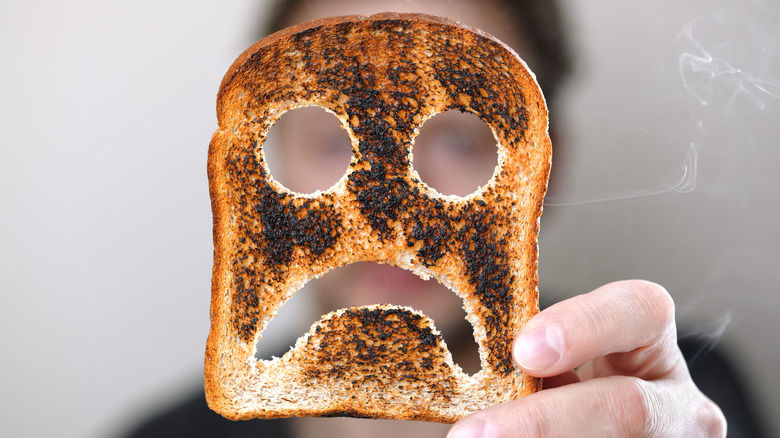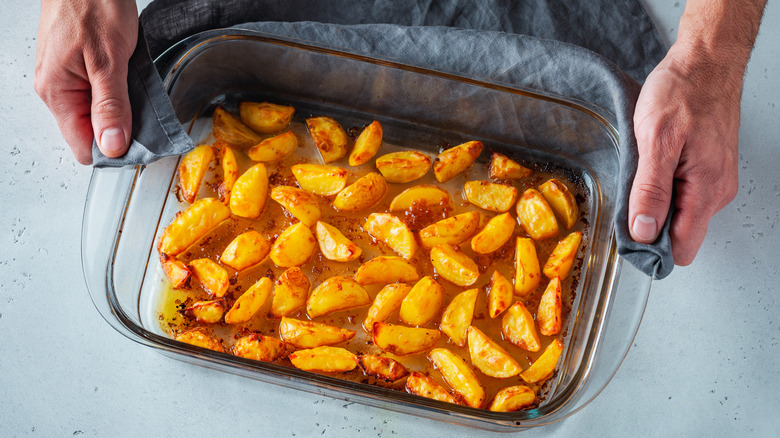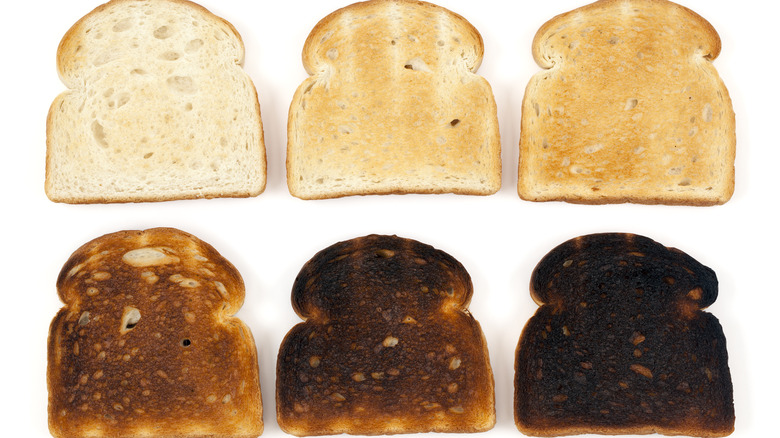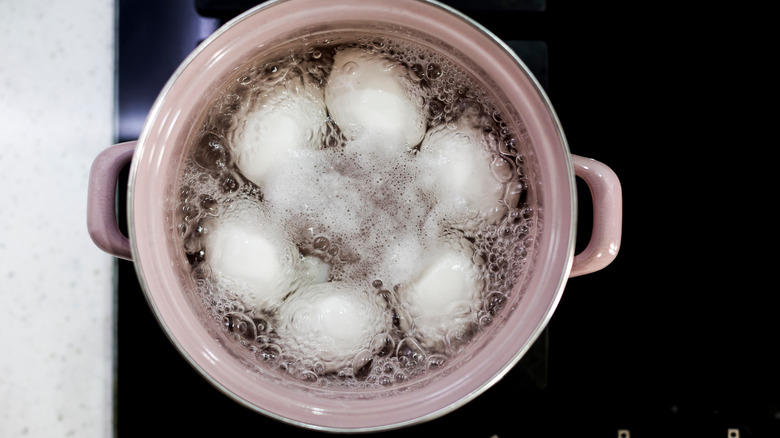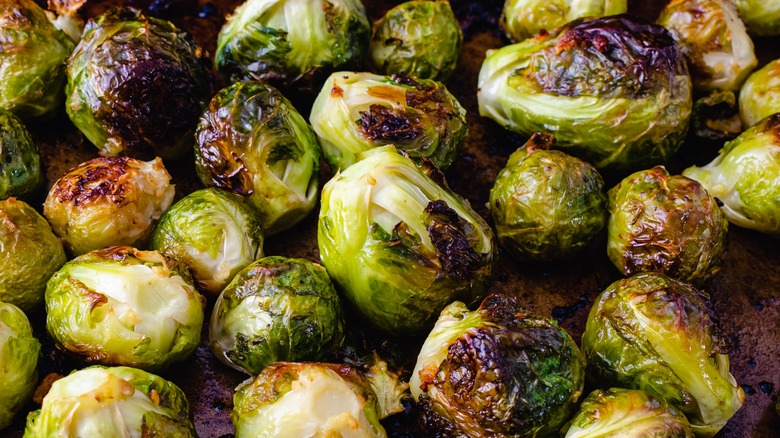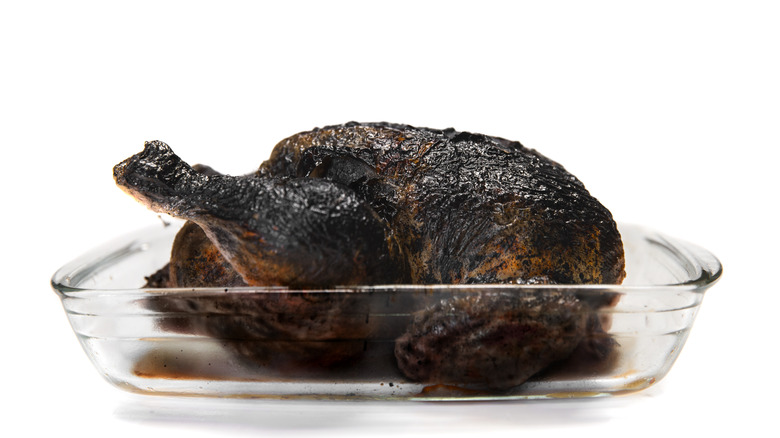9 Overcooked Foods You Might Not Want To Eat And Why
It's no secret that we should avoid undercooked foods. American government organizations, like the Food and Drug Administration (FDA) and Centers for Disease Control and Prevention (CDC), have long warned against consuming raw or undercooked fare. After all, it's a fact of basic food hygiene that harmful bacteria often reside on the surface of uncooked food items. If we don't follow the pre-approved standards for thoroughly heating our ingredients, we could find ourselves infected with nasty foodborne illnesses, from E. Coli to Salmonella.
Because of this dynamic, it's easy to assume that overcooking our food isn't such a bad thing. Sure, overcooked meat and fish don't exactly taste great, but isn't a little bit of charring safer than a full-blown episode of food poisoning? When choosing between scorching our dinners or serving them raw, wouldn't it be better to tend more towards the first option?
While it can be tempting to fall into this mindset, the reality is that neither undercooked nor overcooked food is particularly good for you. Of course, a chunk of meat that's literally burnt along the edges is much less likely to give you a stomach bug (as long as it reached the recommended internal temperature while cooking), but that doesn't mean that eating charred food is healthy over the long term. In fact, overdone foods can actually harm you, both with their terrible smell and potentially high levels of carcinogens. From crispy potatoes to homemade gravy, these are the foods you don't want to overcook.
1. Crispy baked potato fries may not be as healthy as they seem
These days, baked potato wedges have earned a reputation as the healthier alternative to classic French fries. Since they're roasted in the oven rather than fried in fatty oils, these fantastic little potato bits are indeed less caloric on average than their frizzled counterparts. What's more, they tend to offer the same crunchy exterior and almost creamy interior that make traditional French fries so alluring to begin with.
Unfortunately, however, baking your potato fries might not be as totally healthy as many people believe. Per the CDC, baked potatoes are lower in fat and calories than fried ones. However, both types of taters can be harmful if you accidentally overcook them. According to the British government's Food Standards Agency (FSA), potatoes that are cooked at over 248 degrees Fahrenheit can form a burnt crust. And, regardless of the cooking style that you choose, this crust often will contain a harmful chemical called acrylamide.
Acrylamide forms during the cooking process, as your food becomes overcooked or burnt. While this substance is not known to cause the sort of immediate gastrointestinal issues that we see in food poisoning, it's been known to lead to more long-term problems. As explained by the FSA, acrylamide has been linked to the formation of cancer in animals, and some members of the scientific community believe that it can impact humans as well. To avoid this chemical, the organization recommends serving your potatoes "golden brown."
2. Eating burnt toast might actually be a bad idea
Enjoying a slightly charred piece of toast in the morning may seem like a matter of taste. After all, plenty of people prefer their breakfast sandwiches on the crunchier end of things. In fact, a YouGov survey found that 1 out of every 20 Americans likes to eat their toast "very darkly toasted" or "burnt." And, that shouldn't be a problem ... right?
Well, unfortunately, potatoes are far from being the only starch that can be dangerous when served overcooked. Cakes, biscuits, cereals, and — yes — toast were all reported to pose a potential cancer risk. Just like potatoes, these items can produce acrylamide when cooked at more than 248 Fahrenheit. And, no different from its spud cousins, toast is considered healthy as long as it's "golden brown" in color.
Naturally, if you do burn your toast, you can try to remove the charred edges by scraping them off. For a more elegant solution, you might try using a grater on your burnt toast rather than a knife. As the BBC explains, these tactics probably won't eliminate the acrylamide from your meal, but they can make a small difference. In the end, though, the best thing you can do is simply try not to over-toast your breakfast.
3. Burnt coffee could harm way more than just your tastebuds
For many Americans, a burnt cup of coffee is far from being the "breakfast of champions." With its ashy flavor and strong smell, coffee like this lacks the dark, chocolatey quality of a perfectly brewed cup of Joe. That being said, if you do try to power through and sip some burnt coffee, your tastebuds are not the only thing that could suffer. Indeed, coffee is another item on the list of foods that should not be served overcooked. The reason? It, too, contains the carcinogen, acrylamide.
Interestingly, there's a scientific reason why acrylamide has been found in so many burnt food items. When certain fare is exposed to heat, something called the Maillard reaction takes place. As explained by MasterClass, through this process, the natural sugars inside these eats begin to react with amino acids. This means that cooking causes a whole chain of chemical reactions, altering the chemistry of the food and developing both flavor and color.
In the end, the Maillard reaction is what transforms a hunk of raw meat into a juicy steak. It gives food a gorgeous brown color, a thick outer crust, and a brand-new taste. At the same time, though, if this chemical process is allowed to go on for too long, it can cause items — like coffee — to burn. And, when your coffee burns, the Maillard reaction is what can leave dangerous substances like acrylamide in your brew.
4. Overcooking your hard-boiled eggs could ruin your day
Carcinogens aren't the only reason why you might want to avoid overcooking your food. There are also some eats that can smell bad after being exposed to long periods of heat. And when we say bad, we mean really bad. In fact, one of the stinkiest mistakes that you can ever make is overcooking your hard-boiled eggs, as this can make your whole kitchen reek of sulfur.
Interestingly though, there is a scientific reason for this, and it's once again all about food chemistry. Egg whites contain sulfur, while the yolks are rich in iron. When exposed to heat, these compounds begin to interact and, ultimately, form new substances that can change the way your eggs look and smell. One of these compounds is called iron sulfide, which will appear as a thin greenish layer wrapping around the cooked yolk. Another of these is a stinky gas called hydrogen sulfide, which carries the ever-pungent smell of rotten eggs.
While these compounds can definitely downgrade your egg game, the good news is that you can easily prepare your breakfast without making them. One scientific article in the Journal of the Science of Food and Agriculture shows that hydrogen sulfide, in particular, is formed in greater quantities at higher temperatures. This means that you can save your house from a bad smell by bringing your eggs to a softer boil rather than cranking up the heat.
5. Cabbages can reek if not cooked correctly
Hard-boiled eggs are hardly the only overcooked food that can get stinky. When boiled for too long, cabbages also release a strong odor that will likely make you regret ever buying this ingredient in the first place. Because of this, some cooks try to avoid cooked cabbages altogether. Even back in 1988, our culture had essentially ditched these boiled greens in favor of raw fare, like coleslaw.
The good news, though, is that cooked cabbage doesn't have to be stinky. In fact, overcooked cabbage is the real problem. The reason for this is that cabbage plants contain sulfur-based compounds, which are distributed throughout their leaves. Per the Press Democrat, these natural chemicals are the plants' way of defending themselves from hungry animals. When you pluck a cabbage from the ground, or when you chop it into pieces, the greens will naturally start to release these components in an attempt to warn you away. The result is the slightly bitter taste that cabbages are known for.
Once you add heat, however, the game changes completely. Cooking your cabbages for long periods of time — or at too high a temperature — will cause the sulfur-based components within your veggies to turn into malodorous trisulfides. These can seriously stink up your kitchen. Nevertheless, by keeping your heat under control, you can make an amazing cabbage dish, like this delightful cabbage soup.
6. Overcooking Brussels sprouts might be contributing to the veggie's bad rap
Brussels sprouts have kind of a bad rap. Not only are they said to be the most controversial dish served at British holiday meals, but they also have a reputation for grossing out most young kids — and, apparently, also singer-songwriter Kelly Clarkson. The reason? For years, people would prepare these greens by boiling them for extended periods of time, cooking up plate after plate of stinky, colorless leaves.
Luckily, the issue here is not that Brussels sprouts are somehow an inferior vegetable. Au contraire, when cooked properly with a bit of bacon and a nice soy glaze, Brussels sprouts can taste out of this world. However, boiling this vegetable, or otherwise cooking it to a really high temperature, can change its internal chemistry.
As biochemist and cookbook author, Shirley Corriher, reveals on an episode of NPR's "All Things Considered" podcast, adding heat to your Brussels sprouts will make them release hydrogen sulfide gas — the same super stinky compound as rotten eggs. And while you probably won't even notice the smell at first, this can change quickly. After cooking your sprouts for about five minutes at 350 degrees Fahrenheit, they will double the amount of this malodorous gas that they were originally producing. As a result, Corriher warned, you should try to pull your Brussels sprouts from the stove just as they approach the five-minute mark. Otherwise, you will risk serving overcooked food that stinks to high heaven.
7. Overcooked spinach might not be as nutritious as you thought
Spinach has long had a reputation for being healthy. In the past, this leafy green veggie was famous for being the ultra-strong Popeye's fuel of choice. And, more recently, it has taken on the reputation for being a so-called "superfood." According to Healthline, spinach is high in vitamin A, folic acid, and fiber. Because of this, it would be easy to believe that spinach could never represent those ever-famous "empty calories" ... or could it?
Unfortunately, there is some evidence that overcooking your spinach can actually deplete the vegetables' nutritional content. Per a scientific study in the journal Nutrition & Food Science, researchers tested the impact of certain cooking methods on the vitamin C content of three different vegetables. In the end, they found that steaming your spinach can reduce its vitamin C content by 11%, while microwaving can result in a 26% decrease in the substance. Boiled spinach, however, suffered the greatest loss of vitamin C — showing a whopping 51% reduction in the nutrient.
Considering the results of this study, overcooking your spinach is definitely not advised. Instead, food scientists suggest eating a plate full of raw or lightly steamed spinach. If you do really want to get the most out of your greens though, try throwing together a raw kale and spinach salad. After all, this meal is full of vitamins and minerals ... and it's impossible to overcook.
8. Grilled or fried meat should never be overdone
If you've ever hosted a Thanksgiving dinner, you might have also grappled with the fear of serving an undercooked turkey. Indeed, the holidays often come along with the worry of giving your family food poisoning, salmonella ... or even worse. The official recommendation is to cook all poultry until it reaches an internal temperature of 165 degrees Fahrenheit. However, try not to let your bird get too much hotter than that. Overcooked meat, of any type, not only tends to become dry and rubbery, but it can also pose potential health risks.
According to the Cleveland Clinic, scientists have identified some pretty concerning chemical reactions that occur when meat is cooked at high temperatures, resulting in the formation of heterocyclic amines and polycyclic aromatic hydrocarbons. Both of these chemical types have been shown to alter our DNA in a way that increases the chances of developing cancer. Prostate, pancreatic, and colorectal cancer are the three forms of the illness that have been most linked to these substances.
Luckily, there are ways you can try to reduce your exposure to dangerous substances like heterocyclic amines and polycyclic aromatic hydrocarbons. For one, you can scrape any charred bits off of your meat. For another, you can reduce cooking temperatures. These carcinogens tend to appear in meat cooked at temperatures higher than 300 degrees — particularly over a grill or an open fire.
9. Certain types of gravy could lead to long-term health challenges
Interestingly, overcooked meat is not the only type of food that is full of dangerous carcinogens, like heterocyclic amines and polycyclic aromatic hydrocarbons. According to the Cleveland Clinic, certain types of gravy can also be rich in those substances. Uncomfortably, this means that consuming this delicious sauce could also potentially increase your risk of developing cancer.
Naturally though, gravy in and of itself is not particularly dangerous. That being said, the way that we make this treat can lead to bad health outcomes. After all, many people make their gravy by using the drippings that have come from an overcooked turkey or chicken, while others fry up a pan of giblets using leftover fats.
At the end of the day, both of these gravy-making methods involve adding charred or crispy bird bits into your sauce, and those meaty ingredients can be full of cancer-causing agents — especially if they themselves have been overdone. What's more, if you go on to overcook your gravy on top of that, you will be likely adding more carcinogens into the mix than what was already there before. Ultimately, this means that you should be extra careful about how long you simmer this holiday favorite.
